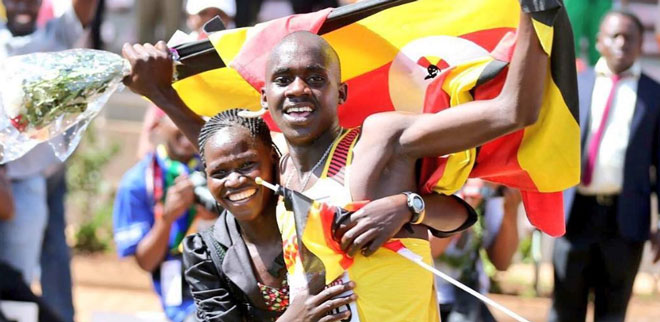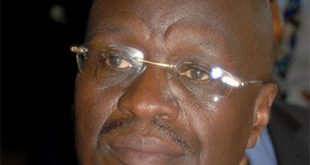
The issues blocking his way to freedom
COVER STORY | THE INDEPENDENT | The Uganda Supreme Court in a landmark case ruled on Jan. 31 that trying civilians in military courts is unconstitutional.
“ All charges or criminal trials or pending trials involving civilians must immediately cease and be transferred to ordinary courts with competent jurisdiction,” ruled Chief Justice Alfonse Owiny-Dollo.
Pressure has been mounting on the Supreme Court to pronounce itself on the issue of civilians being tried in the army courts since the rendition from Kenya and arraignment in the General Court Martial of opposition leaders Kizza Besigye and Hajji Obed Kamulegeya Lutale.
A related case to the Kizza Besigye case is that of a member of his defense team, lawyer Eron Kizza, who was controversially given a nine month jail sentence for contempt of the General Court Martial (GCM) sitting at Makindye in Kampala.
Another prominent case whose course the Supreme Court ruling is expected to impact is that involving a batch of supporters of the opposition National Unity Platform (NUP) who have been held for over four years while undergoing trial in the GCM at Makindye.
Online activity after the Supreme Court ruling, especially on X (formerly Twitter), revealed that the Besigye factor was top of many minds watching the events at the Supreme Court.
“Our leader Kizza Besigye has finally brought down the Military Court Martial. The Military Court Martial has fallen,” wrote Ronald Muhinda, “It only took a bold decision by Kizza Besigye to refuse to take plea in the Military Court Martial that set a chain of events leading to today’s ruling.”
The coram that delivered the landmark ruling comprised of Chief Justice Owinyi-Dollo and justices Faith Mwondah, Percy Night Tuhaise, Mike Chibita, Monica Mugenyi, Elizabeth Musoke, and Catherine Bamugemereire.
The positions of justices Mugenyi and Musoke were deemed to be known because they were part of the Constitutional Court panel that found that military courts are not courts of judicature and therefore, cannot try civilians.
The rulings of the justices of the Supreme Court centred mainly on the principle of fairness in the military courts and the competence of the officers of the GCM. Some justices proposed that, to ensure the impartiality of the court, members of the GCM be appointed basing on their possession of necessary legal expertise, in consultation with the Judicial Service Commission, and not be unduly influenced by military interests.
The CJ expressed concern that untrained persons at the military courts can issue sentences of life imprisonment and death which is outside their mandate.
The CJ was also concerned about the fairness and impartiality of the military courts. “The oath taken by serving military officers binds them to answer to the High Command which makes it difficult for members to be impartial,” he ruled.
Reaction to ruling
In reaction, the Uganda Law Society (ULS) said the ruling “marks a crucial victory for constitutional democracy and human rights in Uganda.” In a written statement, the ULS said that the ruling “settles a 25-year judicial rigmarole regarding the trial of civilians in military courts.”
The ULS said the ruling provides a foundation for healing and reform. It added that the work is far from complete. “We must transform this judicial victory into lasting institutional change,” said the statement signed by ULS president, Isaac Ssemakadde.

The ULS directly addressed the Uganda People’s Defence Forces (UPDF) and security agencies to, among other acts, release all civilians currently held for trial in military courts, cease all pending trials of civilians in military courts, and transfer relevant cases to civilian courts where appropriate.
“Immediate compliance with this ruling is non-negotiable,” the ULS said, “This ruling must serve as more than just a legal milestone – it must become a catalyst for comprehensive reform, reparation, and a guarantee of non-repetition.”
“The pattern of using military courts to intimidate civilians, silence dissent, and circumvent constitutional protections must end definitively,” said the statement.
As part of the build up to this ruling, five-justices of the Supreme Court ruled in December 2024 that military courts were established under the UPDF Act as a parallel judicial framework distinct and juxtaposed against the courts of judicature to address discipline within the rank and file of the army.
That was the unanimous decision in the case of Lt. Ambrose Ogwang, a UPDF officer who was found guilty of murder by the army court and subsequently sentenced to 29 years in prison. Ogwang had sought to overturn his conviction in the GCM through an appeal to judicial system. He won in the Constitutional Court but the government appealed to the Supreme Court which sealed his fate in the GCM.
The Supreme Court justices ruled that soldiers sentenced to death or life sentences cannot appeal their sentences in civil courts because military courts were established under the UPDF Act as a parallel judicial framework distinct and juxtaposed against the courts of judicature to address discipline within the rank and file of the army.
The Constitutional Court in 2022 made the same finding that military courts are not courts of judicature and therefore, cannot try civilians. The court ordered that all files in the court martial against civilians be transferred to civil courts.
The Attorney General had in 2020 appealed a decision by the Constitutional Court which ruled that it was unconstitutional to try civilians in military courts.
The decision arose from a challenge by the former Nakawa Member of Parliament, Michael Kabaziguruka, of his trial in the military court yet he was not a serving member of the UPDF.
Kabaziguruka first petitioned the Constitutional Court in 2016 challenging the trial of civilians in military courts after being arraigned before the General Court Martial on charges of treachery. It was alleged that he wanted to overthrow the government of Uganda. Kabaziguruka said that his trial, before the military court, was unconstitutional and that he had been denied a right to a fair hearing.
Constitutional Court judges; Kenneth Kakuru, Hellen Obura and Remmy Kasule ruled that the powers of the General Court Martial are limited to trial of serving officers of the Uganda army.
On August 05, 2021, a panel comprising chief justice Alfonse Owiny-Dollo, Stellah Arach Amoko, Rubby Opio Aweri, Faith Mwondha and Mike Chibita ordered that the appeal filed by the Attorney General be fixed as a matter of urgency since it involves questions of great public importance.
The Supreme Court heard the appeal in May 2024 but had delayed to give its ruling. In December last year, a group of lawyers representing Besigye and Hajji Lutaale went to the office of Chief Justice Alfonse Owiny-Dollo seeking clarity on the delayed judgment in the Attorney General’s appeal against a Constitutional Court decision that nullified the trial of civilians in military courts.
Led by Erias Lukwago and Kenyan politician and legal expert, Martha Karua, the team demanded answers on why the Supreme Court has yet to rule on the matter, despite the Chief Justice previously describing it as urgent and of public importance.
The ULS has also previously expressed concern at the lack of clarity on the legal framework governing military courts. In a written statement, Ssemakadde said the matter has plagued Uganda’s justice system for nearly two decades, resulting in egregious violations of fundamental constitutional rights and demanded immediate redress.
He said the section of the law governing the military courts, “have been the subject of endless and chaotic interpretation by the judiciary.” He added that some were inconsistent with the Constitution of Uganda.
“ULS is gravely concerned by an unexplained delay of more than 240 days in delivering the judgment in AG vs. Michael Kabaziguruka, an appeal that has spent more than 4 years on the Supreme Court tables,” said Ssemakadde, “The experiences of civilians tried in military courts during this delay have left deep scars, causing long-term trauma and psychological distress. The Karamoja region, in particular, has suffered greatly, with communities displaced and marginalized due to military actions against alleged “Karachunas.”
Ssemakadde said the Supreme Court’s delay had emboldened the military to intimidate and harass advocates, journalists, and human rights defenders who dare to speak out against these violations, creating a chilling effect that silences critical voices and perpetuates a culture of fear and repression.

He said the initial challenge to the trial of civilians in military courts, Constitutional Petition 18 of 2005 ULS v. Attorney General (AG), resulted in a split decision (by a majority of 3 to 2) in favour of upholding the constitutionality of prosecuting civilians in military courts.
But after a 5-year delay, Constitutional Petition 45 of 2016 Michael Kabaziguruka v. AG achieved a favourable ruling (3:2) on July 1, 2021, declaring an end to civilian trials in military courts.
After a 7-year delay, Constitutional Petition 44 of 2015 Captain Amon Byarugaba and 169 Others v. AG resulted in another favourable decision (3:2) on December 15, 2022, upholding the precedent set by the Kabaziguruka decision. After a 5-year delay, Constitutional Petition 4 of 2018 Ssemujju Abdulnul v. AG secured another positive outcome (4:1) on February 3, 2023.
Besigye’s fate
By close of day, Jan.31, Besigye’s lawyers had already filed a petition in the Constitutional Court seeking to stop the proceedings of the case against him in the GCM.
Most punditry so far has indicated that Kizza Besigye and other civilians who have been undergoing trial in the GCM stand a chance of better resolution of their cases if they are switched to the ordinary judicial system.
Besigye’s defense team has previously argued that the GCM has no jurisdiction to try him because he is a civilian, he was abducted from a foreign country to stand trial in the GCM, and that the courts in Uganda cannot without due process try him for a crime he allegedly committed in a foreign country.
The GCM had quashed all three arguments and ordered him and his co-accused to take plea in the military court. The pundits say ordinary civilian courts are likely to rule differently on those matters.
The main issue of contention appears to be that Besigye is co-accused with a serving military officer. In a dramatic late twist to the case, the prosecution introduced a second co-accused Captain Denis Oola, 48, from the UPDF armored brigade.
Justice Monica Mugenyi who also upheld the unconstitutionality of sections of the UPDF Act that allowed military courts to try civilians, appears to have addressed this issue when she ruled that the UPDF Act had “vague provisions” including those that allow civilians who assist military officers in committing crimes to be tried in a military court. She said that section is void for its lack of clarity.
In line with Justice Mugenyi, Justice Elizabeth Musoke was unequivocal about the place of the GCM.
“The General Court Martial is a military organ with limited jurisdiction,” she said in her ruling.
Justice Percy Night Tuhaise reiterated the role of the Directorate of Public Prosecution (DPP) in Uganda’s judicial system. “All prosecution of criminal offenses should be done by the Director of Public Prosecutions (DPP),” she ruled.
However, DPP Frances Abodo has previously said she does not have the mandate to take over cases from the Court Martial. While appearing before a Parliamentary committee she said her office is constrained by the constitution. It’s now not clear how cases before the GCM will move to the ordinary civilian courts, if at all.
There has previously been difficulty for public servants to act without prodding from the executive branch, especially President Yoweri Museveni. In this case, public officials might be constrained further because President Museveni has previously spoken out in favour of military courts trying civilians. In December last year, soon after Besigye and Co. were arraigned before the GCM in Makindye, Museveni said any crime involving a gun was dealt with in a military court to ensure the country’s stability as civilian courts took too long to deal with cases.
He said his National Resistance Movement (NRM) party had enacted a law through parliament in 2005 to allow the use of military courts because of the “rampant activities of criminals and terrorists that were using guns to kill people indiscriminately.”
“The civilian courts were clogged with the many court cases of the whole country: murders, rape, assaults, robbery, land matters, divorce matters etc, etc. They could, therefore, not handle these gun-wielding criminals quickly. Yet, for stabilisation you need speed,” he said. “You have made your own contribution to our peace,” he said of the army courts martial.
 The Independent Uganda: You get the Truth we Pay the Price
The Independent Uganda: You get the Truth we Pay the Price



